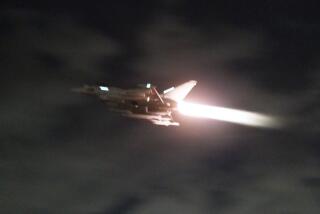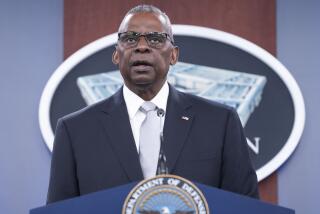U.S. Official Defends ‘Tilt’ Toward Iraq in Gulf War
- Share via
WASHINGTON — Under Secretary of State Michael H. Armacost on Sunday defended the U.S. “tilt” toward Iraq in the Persian Gulf War along with the U.S. naval buildup to protect “lifelines for oil to the West.”
Speaking on NBC’s “Meet the Press,” Armacost said that the renewal of attacks on shipping by Iraq is regrettable but justified. He pointed out that while Baghdad halted attacks on gulf shipping and declared itself willing to abide by a July 20 U.N. Security Council call for a cease-fire, Iran “has sought to play for time” while continuing the war on land.
“The Iraqis did not wish to allow a situation in which restraints were imposed in the gulf while no restraints were imposed on Iran to pursue the ground war,” the official said. “We share their view.”
Increases Danger to U.S.
Armacost, the State Department’s No. 3 official, conceded that the renewal of attacks on gulf shipping increases the danger of U.S. involvement, with 41 U.S. Navy ships in the region.
“By accumulating great power,” he said, “we also have a greater capacity to defend ourselves and to deter any provocation directed against us or those ships we are protecting.”
The under secretary rejected criticism that the Reagan Administration is taking excessive risks by intervening in a dispute where the United States has no vital interest, since only a small part of gulf oil exports go to the American market.
“American interests are at stake when lifelines for oil to the West are in jeopardy,” he declared, saying that the best way to resolve the issue is to stop the war.
“The resumption of attacks means greater urgency to moving beyond the hortatory resolution passed (by the Security Council) on July 20 and putting some teeth into a second resolution.”
The Security Council is supposed to consider enforcement measures after hearing a fact-finding report from Secretary General Javier Perez de Cuellar. Although no action was specified in the July 20 resolution, suggestions have included a ban on arms sales to the uncooperative belligerent or an embargo on oil exports.
‘A Friendly Country’
“Kuwait is a friendly country, an oil-producing country, a moderate Arab country,” Armacost said. “Protection of the oil means the protection of access to oil, it means protection and a solid relationship with a friendly oil producer and it means preventing the Soviets from acquiring a foothold from which they would acquire a protective role over oil destined for the West. That was the interest that we had engaged when we offered to help the Kuwaitis.”
Senate Minority Leader Bob Dole (R-Kan.), a candidate for his party’s presidential nomination, said in another television interview that the United States must be prepared to retaliate if Iran attacks U.S. vessels or those under U.S. protection in the gulf.
“If Iran strikes and we can identify that it’s them, I think we have to retaliate,” Dole said. “I think what we would like to do, however, is to get Iran to comply with the U.N. Security Council resolution, a cease-fire in effect.”
Dole Cites Dangers
Dole, speaking on CBS’ “Face the Nation,” said he understands that “we’re talking to the Iraqis, trying to get them to back off. But they see the Iranian oil being shipped out, a lot of money coming in, the Iranians buying more weapons. The Iranians are tougher on the ground than Iraq, and Iraq is tougher on the sea. So I think we may get in the middle of something we may not be able to resolve.”
President Reagan has made no comment on the resumption of the tanker war in the gulf, but White House officials have been more outspoken than Armacost in their criticism of Iran. One, talking on condition that he remain anonymous, pointed out that Iran depends more than its opponent on sea movement of oil because much of Iraq’s production moves by pipeline.
For Baghdad to halt its relatively easily mounted air and small boat attacks on Iranian tankers means giving up a significant advantage, the official said, while Iran has continued the land war in which it holds superiority in troop strength.
Asked if the Administration in fact blames Iran for the renewed warfare in the gulf, the official replied, “If Iran refuses to respond to the cease-fire call, perhaps that’s where the onus belongs.”
More to Read
Sign up for Essential California
The most important California stories and recommendations in your inbox every morning.
You may occasionally receive promotional content from the Los Angeles Times.













